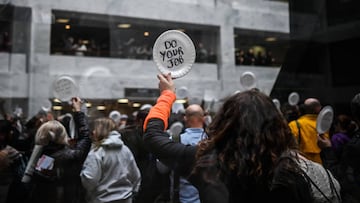Coronavirus: US unemployment figures - 26 March 2020
The impact of the spread of Covid-19 across the United States of America has seen a surge in jobless claims, with more stimulus added by Donald Trump.

The economic impact that the United States has seen with the accelerated increase in cases of coronavirus has caused a record 3.28 million jobless claims in the country, as published last week. And the picture ahead has been described by experts as “catastrophic” with this Thursday's numbers anticipated to match or surpass last week.
Follow all the latest news related to the coronavirus crisis with our daily feed.
Unemployment in USA
The figures released showed the worrying truth to what is happening with the more than three million applications comparing starkly to the previous week’s claims of less than 300,000 (less than 10%). These record numbers are quadruple those of the 1982 recession and economists believe that worse is still to come, with the Federal Reserve Bank of St Louis estimating that the second quarter could see unemployment reach as high as 32%. Compare that to the 25% of the Great Depression of the 1930s.
All this comes despite the packages of financial support that president Donald Trump has put out, although he will hope that this starts to show some results over the coming weeks.

The states most affected by unemployment
Nine states in the country reported a huge increase in claims due to the unemployment rate, with Pennsylvannia being the one most affected.
Pennsylvannia- 378,900 applications
Ohio - 187,800
California - 186,800
Michigan - 129,300
Illinois - 114,700
New York - 80,300
Florida - 74,000
Recent US unemployment news
Investment bank Goldman Sachs has downgraded its outlook considerably for the economy of the United States over the months to June 2020, estimating a contraction rate of 34% (rather than the earlier prediction of 24%) in comparison with the first quarter. This revision is based on the belief that unemployment will rise to around 15% by the middle of the year rather than ‘just’ 9%.
Why unemployment rates matter
Related stories
As the US Bureau of Labor Statistics states, when workers are unemployed, their household misses out on an income, and the whole nation then loses their contribution to the economy in terms of the goods or services that could have been produced.
Unemployed workers also have much lower purchasing power, meaning less is consumed, which can lead to unemployment for others. This creates a cascading effect that ripples through the economy.

